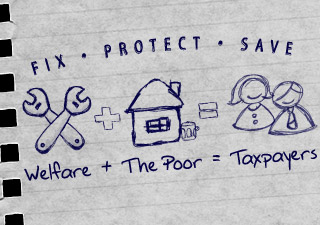Media

Almost $2 Billion in Welfare Waste Weeded Out
Lottery winners on welfare, millionaires on food stamps and supervisors that turn a blind eye to fraud; these are the stories that drive Pennsylvanians crazy. But the Department of Public Welfare (DPW) has good news. Thanks to efforts preventing abuse, the department has saved almost $2 billion since 2011.
That’s billions of dollars that will go to the truly needy instead of those “working the system.” Savings include:
- $338 million from partnering with the Office of Inspector General:
- $233.7 million in “cost avoidance,” or the cost of fraud for six months. The administration assumes all 75,698 cases deemed high-risk since January 2011 would have resulted in some type of fraud.
- $97.5 million from actual overpayment recoveries,
- and $6.7 million from program disqualifications after 3,879 fraud actions, 2,944 of which were criminal complaints, according to DPW.
- $476 million through DPW’s integrity efforts, including:
- $10.9 million from reviewing out-of-state Electronic Benefit Transfer card use,
- $6.9 million from cross-checking federal and state income and benefit information,
- plus casualty, health insurance and estate audit recoveries.
- $1.1 billion from cost avoidance, or stopping fraud before it begins via recipient restrictions programs, reviewing managed care organizations and making sure Medicaid is the payer of last resort.
DPW Budget Director David Spishock noted, “We will try to save dollars up front to save the money before it goes out the door instead of going back and paying and chasing the money later on.”
The transition from pay and chase to upfront detection is a welcome development. In addition, legislation sponsored by Rep. C. Adam Harris to restrict welfare for lottery winners passed the state house. And forthcoming legislation by Senators Argall and Scarnati to increase fraud penalties, address lottery winners, cut down on EBT card fraud and adjust the food stamp (SNAP) asset test would add deterrents for those out to game the system.
However, Pennsylvania can make the welfare system even more secure and, most importantly, more effective at alleviating poverty by restructuring programs to encourage employment and ultimately independence. How? By continuing to pursue more flexibility from the federal government to customize anti-poverty programs and tackling the welfare cliff, where families’ lose income for taking a promotion or working longer hours.